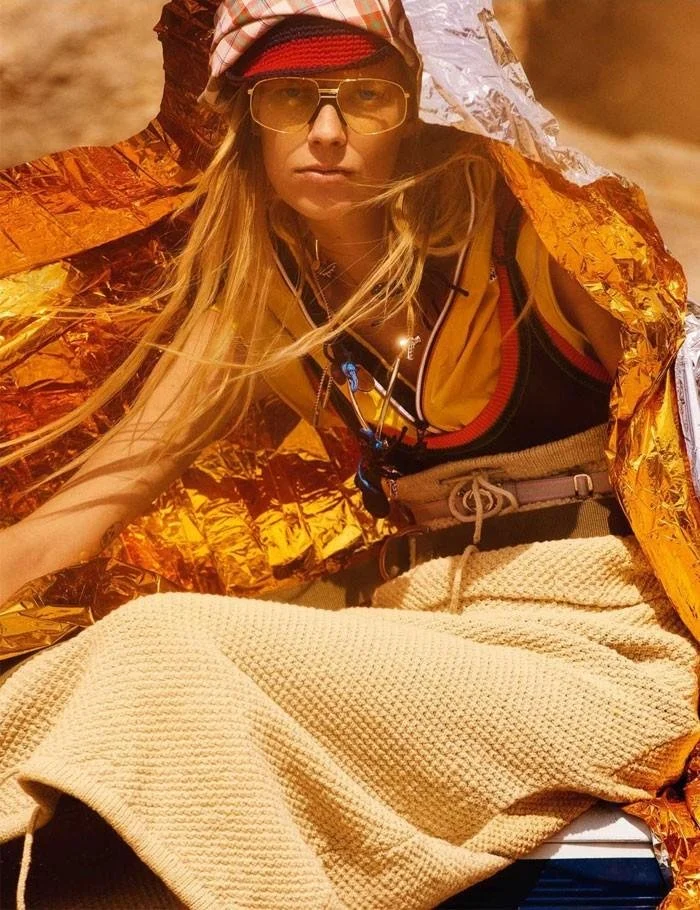Elsa Hosk Unveils New J Brand Collab Promoting Latest Denim Innovations In Sustainability Drive
/Victoria’s Secret Angel Elsa Hosk shares a new Fall 2019 denim collaboration with J Brand. Photographer Zoey Grossman flashes Elsa in key pieces that are original designs and revived classics from the Swedish beauty’s closet. /Makeup by Stacey Tan; hair by Kali Kennedy
J Brands is part of Fast Retailing Co., Ltd, a Japanese company that also owns UNIQLO and is the world’s third-largest casual clothing retailer with annual sales of $19bn. Other brands include Comptoir des Cotonniers, GU, Helmut Lang, Princesse tam.tam, and Theory.
In 2016 Fast Retailing Co. unveiled plans for its Fast Retailing Jeans Innovation Center in Gardena, Calif. next door to the Japanese-owned Caitac Garment Processing location. Caitac has been washing jeans for local denim makers for years — and most of us know that iconic denim is one of the most unfriendly to the environment products in the fashion industry.
Masaaki Matsubara, chief operating officer of the Jeans Innovation Center, says that Los Angeles is the perfect spot for the innovation center, because LA is the center of the denim world. “If we had built this center in Tokyo, it would have been too influenced by vintage. If we had done it in Europe, it would have been too influenced by fashion. Here in L.A. it’s a mix of all cultures. Jeans originated here.”
Matsubara is proud of technologies using nano-bubble and ozone-washing machines, which were used in select styles of J Brand and Uniqlo jeans. The process cut water usage by an average of 90 percent and even 99 percent in select cases.
Fast Retailing has also dropped its use of an industrywide practice of using pumice stones for stone washes, resulting in jeans having a worn and distressed appearance. Now the company is using synthetic stones, which help create a vintage look but last significantly longer than pumice.
By 2020, the technology will be used for all of Fast Retailing’s denim brands.
“We have innovated with existing technology, figuring out how to outperform other brands at scale to achieve water savings of up to 99 percent in the wash process at our full production scale. We never intended to reduce water used for jeans washing by only 10 percent or 20 percent. Ultimately we want to reduce water usage to near zero,” Matsubara said in a statement.
Cutting water usage was not the only sustainability initiative underway by Fast Retailing. Earlier this month it announced that by the end of 2020 it wants to reduce single-use plastic by up to 85 percent at its 3,500 stores around the world. In September 2019, brands will switch to eco-friendly paper bags,and end its use of plastic packaging for its Uniqlo and G.U. products, using sustainable alternatives instead.
In the most fun aspect of sustainability initiatives, Fast Retailing tasked 18 students at the Fashion Institute of Design & Merchandising in Los Angeles to take unwearable clothing from Uniqlo’s all-product recycling initiative as well as alteration scraps to create upcycled designs. They are now being displayed at the Uniqlo store at The Bloc retail center in downtown Los Angeles, writes Apparel News.
Working with J BRAND, Elsa Hosk’s pieces reflect many of the company’s recent technology innovations, including four Photo Ready HD denim styles as well as pieces cut in the company’s sustainable Real-Life “Rigid” denim.
“Ever since I was a kid, I was obsessed with jeans and how they fit. If there was a trend that hadn’t come to Sweden yet, I would get big jeans then recut and re-sew them. So when this project came up with J BRAND, it was just so exciting for me. They are such an iconic denim brand (the first designer jeans I bought when I came to the US) who are also working on being sustainable which is so important. They are known for making the best jeans with extremely flattering fits, so I just wanted to take some of those sustainable fabrics and push the shapes a bit. Anything we can do to help the environment is so crucial right now, and I’m proud to say that all the blue jeans in this collection use 90% less water in production and the rest of the jeans use upcycled fabrics to cut down on waste. All the styles have recycled thread, hardware, and hangtags.”
In addition to all the water reduction and pumice stones reduction policies, fabrics are made of recycled and sustainably sourced materials. One style utilizes up to 30% recycled cotton; all tags, trims, and hardware used in Elsa’s designs are made of recycled and/or sustainably sourced materials



















